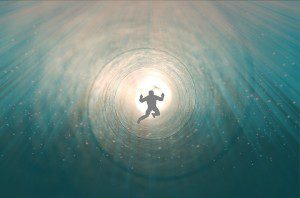Think about it, if Jesus didn’t pass out when he ascended to heaven, what does that convey about his body? Was Jesus the first astronaut, an alien, a trans-human?
The classic Christian view of divinization claims that he became what we are so that we might become what he is. But how are we to interpret the doctrines of incarnation, resurrection and ascension in the space age? If we are to become what he is, does that mean we will all become astronauts, aliens, or trans-human, too? If so, are we to wait for him to help us make the ascent, or should we try and take the big leap ourselves? The “should” question leads us to ethical considerations. I will return to the ethical point a little later.
We are already making the divinized ascent, if you perceive space exploration as a form of “immanentized transcendence,” to quote from my colleague, Derrick Peterson. Besides theological and ethical considerations, space exploration requires that we account for physiological and psychological challenges, among other things. An article titled “How Will Living on Mars Affect Our Human Body?” addresses some of these subjects. Humans have always developed to adjust to their environment. Such adaptations or transformations would be necessary to survive on a place like Mars. The movie The Martian reveals some of the technologies that NASA is developing to help humans make the journey to Mars in the 2030s (See “Nine Real NASA Technologies in ‘The Martian’”; see also an earlier article titled “Living on Mars: How to Survive the Red Planet”).
Movies like The Martian and Interstellar reflect how difficult space travel can be for astronauts. Just think of the sense of isolation Matt Damon’s characters experience in the two movies: in Interstellar, the sense of isolation leads him—Dr. Mann—to madness. So, would it do us good to adapt or change the human species to limit or remove many if not all emotions for the sake of survival on isolated spheres? Here we return to ethical considerations.
In an interview with SPIEGEL, famed sociobiologist E. O. Wilson engages religion and ethics, including Roman Catholic and universal Christian teachings bearing on this article, including the subject of whether or not we should “change” our human emotional state. I will quote below from the interview, as it engages directly the subject at hand:
SPIEGEL: It seems that, in this process, you would like to throw religions overboard altogether?
Wilson: No. That’s a misunderstanding. I don’t want to see the Catholic Church with all of its magnificent art and rituals and music disappear. I just want to have them give up their creation stories, including especially the resurrection of Christ.
SPIEGEL: That might well be a futile endeavor …
Wilson: There was this American physiologist who was asked if Mary’s bodily ascent from Earth to Heaven was possible. He said, “I wasn’t there; therefore, I’m not positive that it happened or didn’t happen; but of one thing I’m certain: She passed out at 10,000 meters.” That’s where science comes in. Seriously, I think we’re better off with no creation stories.
SPIEGEL: With this new Enlightenment, will we reach a higher state of humanity?
Wilson: Do we really want to improve ourselves? Humans are a very young species, in geologic terms, and that’s probably why we’re such a mess. We’re still living with all this aggression and ability to go to war. But do we really want to change ourselves? We’re right on the edge of an era of being able to actually alter the human genome. But do we want that? Do we want to create a race that’s more rational and free of many of these emotions? My response is no, because the only thing that distinguishes us from super-intelligent robots are our imperfect, sloppy, maybe even dangerous emotions. They are what makes us human.
I share Wilson’s wariness about changing our emotional states. However, I wonder if his reason for hitting the eject button on making such changes or ‘advances’ is sufficient, namely, that we would no longer be distinct from super-intelligent robots. Of course, he may have other reasons not set forth in the interview. Still, his rejection of creation stories as well as Christ’s resurrection (as stated in the interview) proves problematic for me not simply on theological grounds, but also ethical grounds. In what follows, I will engage these considerations.
In a previous post at this blog, I entertained space and AI technology business magnate Elon Musk’s fear that humanity may simply be the “biological boot loader for digital superintelligence” (See “How Should We Live If Humanity Is the ‘Biological Boot Loader for Digital Superintelligence’?”). Now some will argue that Musk’s fear is far-fetched, claiming that there is no need to be concerned about humans being supplanted in the foreseeable future by AI (See Otto Tellick’s initial comment at the previous post). Perhaps there is no risk in the foreseeable future; still, we should not avoid addressing such concerns, since today’s possibilities often become the future’s actualities, and the discussion does bear upon other matters, including transhumanism.[1]
In reflecting upon Musk’s concern, I entertained Immanuel Kant’s ethical system and how it might bear on whether or not humanity should pursue superior forms of artificial intelligence, even if such technology would pave the way for our extinction while securing our legacy scientifically. Kant’s attempt to frame ethical considerations on practical reason alone apart from revelation likely does not safeguard against collective human suicide, if our creations are superior to human rationality; perhaps we are no longer ends in ourselves as well as means, but only means to the end of superior rational forms of AI (See the presentation of Kant’s ethical system and my response to it in “How Should We Live If Humanity Is the ‘Biological Boot Loader for Digital Superintelligence’?”).
Does it prove sufficient to safeguard human distinctiveness on rational or emotional factors alone, and apart from transcendent considerations reflected in monotheistic religious traditions, such as the doctrine of creation? If human distinctiveness is something given by God rather than gained by our own workings, we must guard against transforming it. Moreover, the resurrection and ascension, while signifying a glorified state, does not discount or eradicate our creatureliness. In fact, in Jesus’ case, he still bears the full marks of humanity, and always will, including his cruciform flesh.
While I do not wish to claim that such theological considerations resolve all difficulties, they should not be discounted, as Wilson so speedily dismisses them. Certainly, his sociobiological analyses are often illuminating, and are factors that we must account for in assessing human identity and its future as a species. Still, his biological reductionism does not provide sufficient grounds for safeguarding against altering the human genome.
Just as Kant’s seemingly rational system may very well have presupposed his Judeo-Christian heritage, including the doctrine that we are created in God’s image and have inherent dignity and worth (and therefore, are not to be considered mere means to ends, but also ends in ourselves), so Wilson may go beyond evolutionary theory in his reasoning for opposing altering the human genome. If the survival of the fittest is what really counts, why should we not help out our own species’ chances of survival (rather than go the way of Homo heidelbergensis and Homo neanderthalensis; see Origins of Humankind) by removing all or many problematic emotions so that we can compete with super-intelligent robots?
There are various concerns that emerge regarding the advance of trans-human or post-human states. Refer to this piece titled “Transhuman” for points advanced by proponents and opponents of transhumanism respectively. The piece begins with a quotation from the game “Eclipse Phase”:
Your mind is software. Program it.
Your body is a shell. Change it.
Death is a disease. Cure it.
Extinction is approaching. Fight it.
If extinction is approaching in view of AI’s rise, should we fight it by messing with our messy emotions and join AI? Or should we fight it by leaving our emotional states alone, even if AI surpasses us as a race? What are we to do—not simply when playing tabletop games but when considering life itself? In the end, perhaps Homo sapiens will come to an end in one way or another no matter what we do.
Consideration of the orthodox doctrine of divinization and its modern secular counterparts with space exploration give us much to consider. We should not discount either treatment, as we probe ethical frontiers.
This post was simply that—to probe—rather than to give final consideration to the matter. I intend to keep it hanging—not unlike the doctrine of the Ascension. At least for now.
_____________________
[1]See the discussion of the technological possibility and ethical merits of pursuing post-human and trans-human life for space travel, among other things, in the video presentation “Astrobiology & Theology: A Discussion” held at the Library of Congress (beginning at 39:10).














